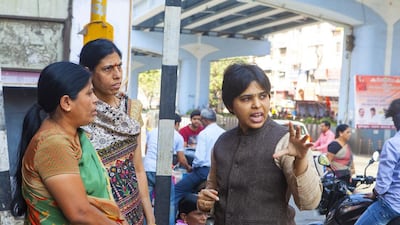PUNE // Trupti Desai seems like an unlikely crusader, as she sits, calm and collected, in the office attached to her home.
But Ms Desai, 32, a social activist, has been at the forefront of a series of high profile and successful campaigns to secure access for women to religious sites they have been excluded from in India – a role that has seen her receive death threats and become the victim of violent attacks.
Women entered the inner sanctum of the historic Haji Ali mosque and tomb in Mumbai for the first time in five years in November after a campaign in which Ms Desai played a critical role led to a court order to lift a ban on their presence.
“I noticed from a young age that there was discrimination between boys and girls and how men always want to control girls in Indian society and I didn’t feel this was acceptable,” says Ms Desai, who lives in the city of Pune, a few hours by road from Mumbai. “The focus is always to get women married and they’re considered a second grade citizen in society.”
The activist cuts a tomboyish figure, with her short hair, smart brown Nehru jacket and maroon coloured churidar leggings. The scent of incense wafts through her office, which is decorated with ornaments depicting the Hindu god Ganesha and photos of Ms Desai.
In 2010, Ms Desai founded her activist organisation, the Bhumata Brigade, with the aim of tackling women’s rights issues and corruption. The organisation now has 7,000 members.
Her activism has created a huge stir and filming on a biopic about her is scheduled to start later this month.
“I was always interested in social work and when I was at school and college, I used to take part in protests,” says Ms Desai who is now married and has a seven-year-old son.
Ms Desai heard in 2015 that women were banned from worshipping at the holy shrine of the Shani Shingnapur temple in Maharashtra state, and that if a female touched the idol, it would have to be bathed in milk to cleanse it because women were considered “impure”.
“I was really affected by this,” she says. “I called a meeting of my group and we decided to start a movement to allow women the same access as men to temples. They should have equal rights.”
In December 2015, she travelled to the temple with members of her group, intending to climb on top of the platform where the idol was situated. But she was stopped by local villagers and security guards, the temple’s trustees.
The incident grabbed the Indian media’s attention, and Ms Desai says some conservative Hindus responded by labelling her “anti-Hindu” and saying “she was not fit to be a Hindu”.
Undeterred, Ms Desai gathered 1,500 female members of the Bhumata Brigade from across Maharashtra and organised 45 buses to take them to the temple in January last year. But their efforts were again thwarted after police detained them.
In response, veteran activist Vidya Bal filed a petition in the high court, citing a 1956 law that gives women and men equal rights to enter temples in India. The court ruled in favour of the petition, saying women were legally allowed to enter the Shani Shingnapur temple. Ms Desai returned to the temple in April and was granted entry to the sanctum.
“It was a big victory and a breaking of tradition,” she says. The win inspired her to work on other cases including helping women to gain entry to the sanctum at the Haji Ali mosque.
Ms Desai had planned to try and enter the Sabarimala temple in Kerala this month but the state government said they would prevent her from entering.
Although Ms Desai says she believes things are improving for women in India, her activism has put her at great personal risk. When fighting for women’s rights at the Mahalaxmi temple in Kolhapur, protesters threw chilli powder at her eyes and beat her up. She ended up in hospital for a day.
She also says contract killers were hired to kill her when she was campaigning for access to another temple. Her car was pelted with stones by a group of attackers on motorbikes, smashing the windows and injuring the driver.
“We had a lucky escape,” she says. “Had we stopped the car, they would have killed us.”
But when asked whether she ever feels scared, Ms Desai says she “is happy to die for people’s causes rather than dying of a heart attack or a natural death”.
foreign.desk@thenational.ae

